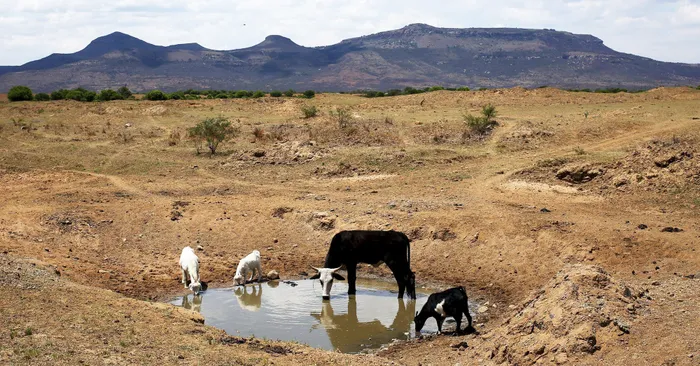'Toilet-to-tap' water getting a raw deal from public

DRY TIMES: Livestock drink from a drying river outside Utrecht, in north-western KwaZulu-Natal. Picture: Reuters DRY TIMES: Livestock drink from a drying river outside Utrecht, in north-western KwaZulu-Natal. Picture: Reuters
SOUTH Africa and other semi-arid countries expected to be affected by extreme weather such as drought might have to think about recycling used toilet and bathroom water to augment the water supply system.
The benefit of pumping this recycled water, also known as “black water”, could mean the difference between life and death in coming years, according to environmental experts.
WWF-SA International Global Climate and Energy Initiative programme co-ordinator Jaco du Toit said Africa could expect to suffer increased pressure on water resources, particularly in drought-prone regions.
He said increased drought would lead to water scarcity in all sectors, particularly in agriculture and for domestic use for long periods of time.
“The science is still unclear about whether the long-term average level of rainfall will fall but rainfall is predicted to become more intense over short durations of time,” Du Toit said.
Umgeni Water chief executive Cyril Gamede, speaking at recent briefing on KwaZulu-Natal's water crisis, said that despite the desperate need for water - a situation set to worsen in coming years - many people had a “psychological block” when it came to the idea of black water.
“You mention the word sewage and there is immediately a stigma, even if the water is technically pure. If you drank a glass of water that had been purified, you wouldn't even taste the difference, but there is a social dilemma. You have to think of ethics,” he said.
Umgeni Water corporate stakeholder manager Shami Harichunder said the issue was sensitive in terms of religion and other factors.
“But the truth of the matter is we don't have a choice. Water is scarce and it will become even scarcer. Soon, we will have no option but to use this water,” Harichunder said.
He said Umgeni Water would be experimenting with the idea at the Darvill Waste Water Plant, where they would be processing black water for use in its internal cleaning processes. He said the water would not be supplied to the public.
Southern African Faith Communities’ Environment Institute head Dr Stefan Cramer said the treatment of black water to augment municipal water supplies was a proven technology routinely applied in many countries where demand outstripped supply.
“Modern water purification technologies can restore the quality of drinking water after nearly any use. Chemical treatment and filtration can remove nearly all contaminants but at a huge cost of chemicals, energy and other efforts (sic). It's a technology of last resort if all other methods to reduce consumption of drinking water have failed.
“Climate change events will lead to higher demand as temperatures soar and water supplies become scarce. Water-saving technologies and strategies become more and more important and are by far a better solution.”
Cramer said protecting groundwater resources from contamination was another approach to safeguard drinking water supplies that would make black water recycling unnecessary.
WWF-SA Freshwater Programmes Senior Manager Christine Colvin said water recycling could help to increase supply.
In Durban, however, more than 5000 residents gave the thumbs down to the city’s controversial toilet-to-tap water recycling proposal in 2012.